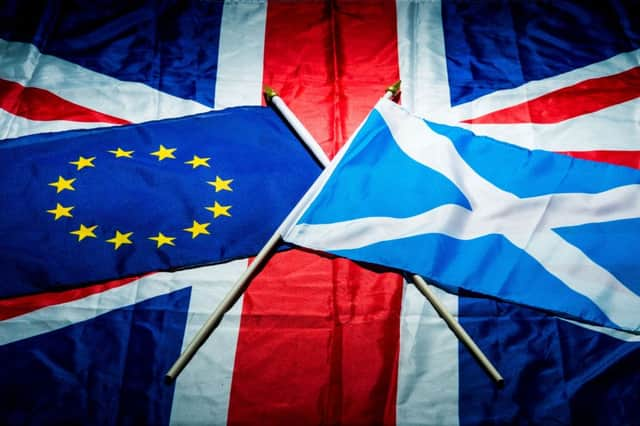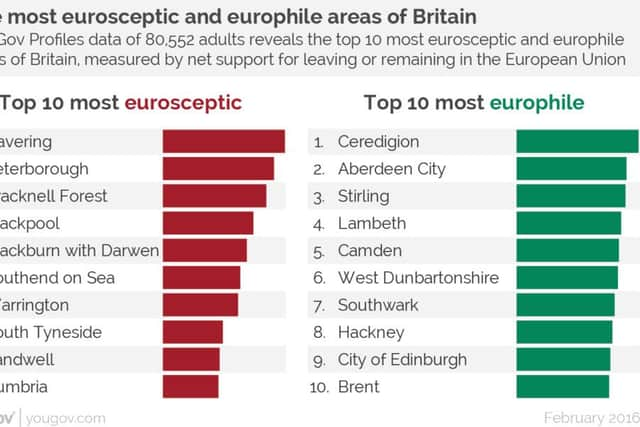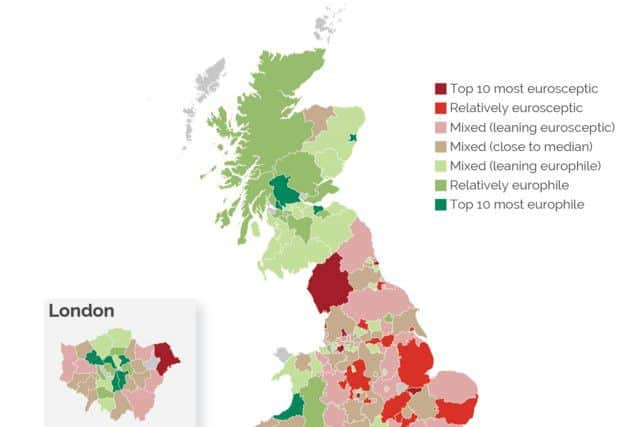Poll: Scotland has four of top 10 most europhile UK counties


Aberdeen is rated the second most europhile in a ranking of local authority areas, followed by Striling in third place, West Dunbartonshire sixth and Edinburgh ninth. The county of Ceredigion in mid-Wales was first.
All of the top 10 most eurosceptic places are in England, according to a YouGov poll of 80,552 adults carried out last week.
Advertisement
Hide AdAdvertisement
Hide AdThere are 206 local education authorities in England, Scotland and Wales, 188 of which YouGov had large enough samples to report a position on the EU.


All Scottish council areas surveyed were found to be Europhile-leaning, with the sole exception of Moray, which was mixed.
Prime Minister David Cameron has called a referendum on European Union membership for Thursday, June 23.
“There is no doubt that Scots are more likely to vote to remain than voters in England and Wales, but not necessarily Northern Ireland,” said John Curtice, professor of politics at the University of Strathclyde.
“That doesn’t mean they are europhile - as pointed out in the Scottish Social Attitudes Survey, people in Scotland are still quite likely to say they want to see the EU’s powers reduced, but they don’t want to get out.


“The SNP, for example, does not want to be in the Schengen Area or use the Euro.
“The crucial point is that Scotland is not europhile, but being part of the European Union has now been bound up in the SNP’s vision of independence.
“It’s a stark contrast to the 1975 referendum when the SNP campaigned to leave the EU, and Scotland was less likely to be in favour of staying in. It’s been turned around because the SNP has changed its mind over the last 40 years.”
Advertisement
Hide AdAdvertisement
Hide Ad

The prospect of a so-called Brexit on the strength of English votes has revived the debate on a second Scottish independence referendum.
SNP leader Nicola Sturgeon said this week there was a “real chance” of a new vote if the UK backs leaving the EU, but a majority of Scots opt to remain.
But the First Minister added she did not want Scotland to become independent as a result of UK withdrawal from the European Union.
“I want the UK as a whole to stay in the EU because I think that option will be better for the rest of the UK, I think it will be better for the EU and, should Scotland become independent in the future – something I believe will happen – I think it will be better for us too,” she said.


All of the political parties currently represented in the Scottish Parliament are officially in favour of the UK retaining its place within the EU, but that could change following the election on May 5.
So far, only one MSP, Margaret Mitchell of the Conservatives, has announced their intention to back the Leave campaign. Party leader Ruth Davidson will vote to remain.
A Tory spokeswoman said: “Ruth has been clear from the outset that, while she supports the UK remaining in the EU, Scottish Conservative MSPs are free to vote how they please. This is in marked contrast to other political parties, who want MSPs to base their vote on which scenario would most likely trigger a second independence referendum.”
MEP David Coburn, the UK Independence Party’s only elected official in Scotland, said he was confident of persuading more voters north of the border of the benefits of Brexit.
Advertisement
Hide AdAdvertisement
Hide Ad“I want to see power brought back from Brussells to both Holyrood and Westminster,” he told The Scotsman. “We will gain power over our fishing and energy policy.
“Production of steel in Scotland has been destroyed by high energy costs and EU trade tariffs. We should be organising our own trade agreements.”
RISE, a left-wing electoral alliance forged to fight the 2016 Scottish Parliament election, accommodates members in favour and against EU membership from a socialist perspective.
Jonathon Shafi, RISE national organiser, said: “It would be unacceptable for Scotland to be dragged out of the EU against the wishes of the majority of its voters.
“In its present form, the EU is a bosses’ club, committed to free market economics and austerity. Some of our candidates believe that reform can be achieved from within that club; some think it can only be achieved from without.”
